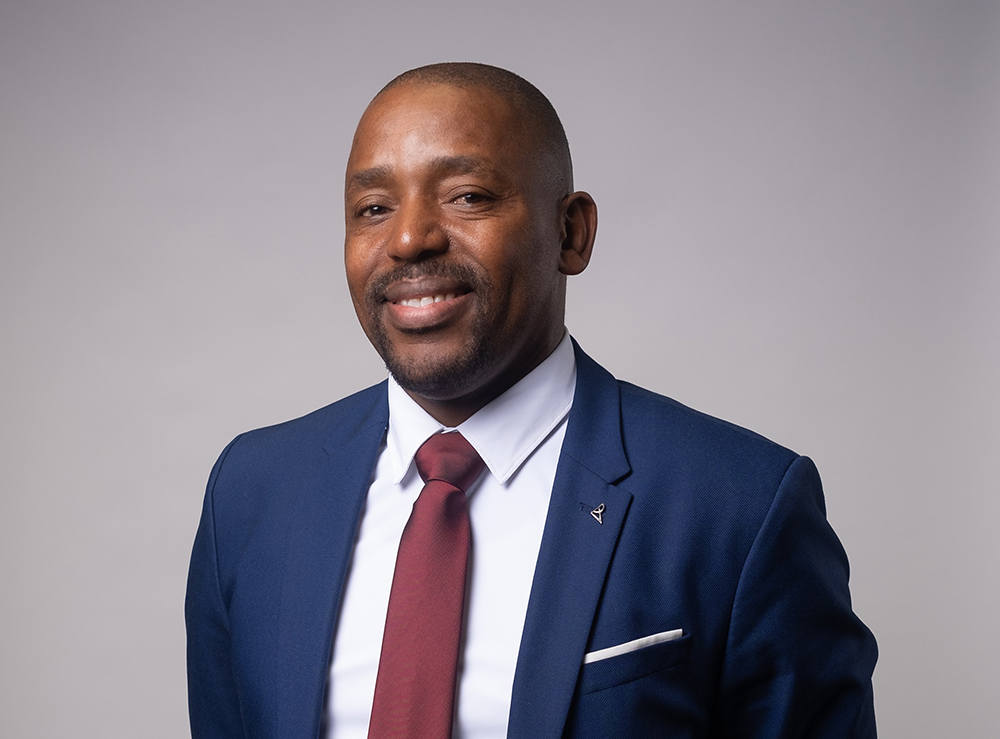
When Gert Coffee, the previous chairman of ASPASA, a knowledgeable mining executive who had served on the ASPASA management committee for more than 20 years, decided to step down from the role at the end of 2022, the association looked no further than Collin Ramukhubathi, who brings a wealth of knowledge to this important function.
With over two decades worth of experience in the mining sector, Ramukhubathi – an executive director at Afrimat, a leading mid-tier mining and materials company providing Bulk Commodities, Construction Materials, Industrial Minerals and Future Materials and Metals – has, over many years, served in various leadership positions in the mining sector.

Having started his career as a mechanical technician at Basil Read in Botswana, he later joined AfriSam, a leading construction materials supplier in South Africa, initially based in Gauteng, and later in Ladysmith, KwaZulu-Natal. He eventually moved to Cape Town to join Portland Quarry in 2006, before joining Johannesburg Stock Exchange-listed mining company Afrimat in 2009 as area manager for the Western Cape business.
Ramukhubathi has exhibited exceptional leadership qualities at Afrimat over the past 14 years, and currently serves as executive director, overseeing the People Management and Sustainability departments of the business.
Apart from his people management skills, sustainability is a subject close to his heart, which is why he believes that environmental management should be “front and centre” of every quarry and mine. Through its Environmental Audits, ASPASA has over the years championed high levels of environmental management at member operations. However, Ramukhubathi believes there is a lot more to be done to align members with ever-evolving and stringent environmental legislation.
Health and safety is yet another subject of great interest to him. He is upbeat about the role that ASPASA has played in championing health and safety at member operations. Through its famed ISHE Audits, the association has set the bar high in compliance. “These established audits are highly regarded in our industry, and even the regulator, the Department of Mineral Resources and Energy (DMRE) has on several occasions commended ASPASA member operations for demonstrating exceptional compliance levels when it comes to health and safety,” says Ramukhubathi.

Apart from Environmental and ISHE Audits, ASPASA also provides Blasting and Technical Audits. Building on the foundation of the success of these audits, Ramukhubathi says the association seeks to drive collaboration with other industry stakeholders to close all the other crucial gaps in its offering. One of the immediate key focus areas is community relations, which he believes is a pressing matter in the mining industry.
Community relations, he says, have in recent years become an increasingly important component of mining companies’ strategic thinking. “In my view, the most difficult part of mining these days is not mining itself; it has become even more difficult to deal with community issues,” he says. “Quarries, for example, are by their very nature located close to communities. Given this close proximity, they ought to be at the receiving end of all community grievances, even when the complaints are not related to mining activities. In some cases, it could be the lack of service delivery, which in the end is misdirected at mining operations.”
It is therefore important for ASPASA, he explains, to play a leading role in finding a lasting solution to deal with community issues. This, however, will be done in close collaboration with the Minerals Council South Africa and other stakeholders such as the government and labour.
Ramukhubathi believes it is high time ASPASA, as a member of the Minerals Council, works closely with its parent association and leverages the organisation’s influence and resources to find solutions for quarries and small-scale miners at large. The Minerals Council represents about 95% of mines in South Africa and is a leading voice when it comes to lobbying on behalf of the industry.
“For us to deal with some of the issues bedevilling small-scale miners in the country, we will focus our efforts on working closely with the Minerals Council. That way we will be able to leverage some of the resources that we, as a small association, don’t have to deal with issues that affect us. For example, the Minerals Council already has a division that specifically deals with community relations, something we don’t have as ASPASA.”
While the Minerals Council’s primary objective is to play an advocacy role for the industry, it also plays a critical role in facilitating collaboration between member companies in the area of community development. Furthermore, it works with member companies in the development and promotion of sound and proactive community relationships through effective stakeholder engagement, including engagement with the regulator, district and local municipalities, and other interested and affected parties.
In addition, the Minerals Council already has a legal department which facilitates legal inputs necessary to act on behalf of its members in promoting, opposing or influencing legislative and other measures affecting members’ interests, and to also mitigate legal risk which has a direct adverse impact on the interest of the Minerals Council and that of its members.
“Given that the Minerals Council’s legal team specialises in the lobbying of and advocacy to the DMRE, Parliament, the South African Revenue Service (Sars), National Treasury and other government departments, we believe we can also leverage this legal resource to deal with issues affecting us, like, for example, small-scale miners. One of the pressing legal matters at hand is the issue of royalties, which has been a hotly contested issue among quarry owners and operators as to where the value of a mined product needs to be determined in order to calculate exact payments,” he says.
Another important area for Ramukhubathi is illegal mining, which is on the rise in South Africa and presents challenges for the mining sector, especially small-scale operations such as quarries. No single stakeholder, he says, can address the challenge of illegal mining and collaboration is key. ASPASA, individually and through the Minerals Council, remains committed to working with other stakeholders in addressing illegal mining.
“Illegal miners have a massively unfair advantage over legal operators in the industry. They don’t pay royalties, tax, or make any other statutory contributions to the government or towards the sustainability of the industry,” says Ramukhubathi. “Neither do they need to observe safety, health, environment and quality legislation, which means they can expose workers and communities to danger without any form of retribution.”
As part of its collaborative efforts, ASPASA will also take advantage of its relationship with the country’s roads authority, the South African National Roads Agency Limited (SANRAL), to promote the use of commercial quality aggregates rather than borrow pits next to existing quarries.
In conclusion, Ramukhubathi reiterates the importance of collaboration to drive the industry forward and rise above some of the common challenges. “Collaboration, unity and speaking with one voice are the most important buzzwords for us. It is important for the industry to speak with one voice; that way the regulator will listen to us more keenly than when we present issues in fragmented voices,” concludes Ramukhubathi.














